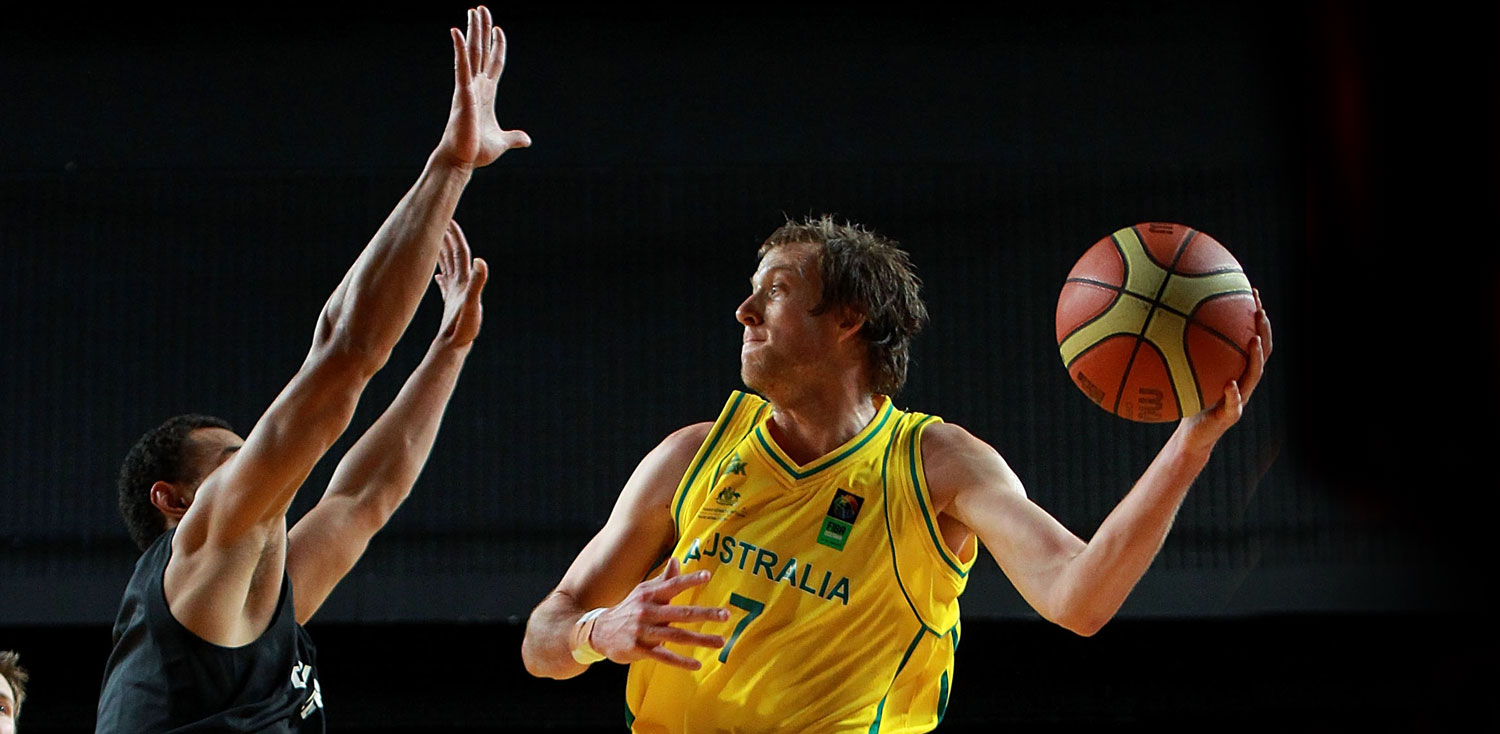The Australian men’s basketball team spends less than a month together in any given year, but training drills and what people may describe as traditional teamwork have not figured prominently in the Boomers’ preparation for the 2016 Olympic Games in Rio de Janeiro.
“At our skill level, we are not going to make a player a better shooter or a better ball handler in six weeks,” says Boomers coach Andrej Lemanis. “The challenge for us is – given all the different skill sets we have – how we put that all together to give us the best opportunity to succeed.”
If you know little about the make-up of the men’s national basketball team at the moment, understand this much: Lemanis isn’t being flippant by giving lip service to what for many would seem like the basics. Heading to the Olympic Games in Rio in August, the Boomers have a real shot at winning Australia’s first men’s medal in the sport.
A quick look at the team’s potential starting five shows why. For the first time, it will likely be a run-on roster made up entirely of players from the NBA competition in the US: Andrew Bogut (Golden State Warriors), Joe Ingles (Utah Jazz), Cameron Bairstow (Chicago Bulls), Patty Mills (San Antonio Spurs, pictured) and Matthew Dellavedova (Cleveland Cavaliers).
So what exactly does a coach do with what is, on paper, the best Australian basketball team of all time?
Building team culture
“We spend a lot of time when we are together talking about our values and who we’re going to be, what we are going to stand for and how we are going to interact together,” says Lemanis.
That isn’t just talk. When Lemanis took over the coaching role after London’s 2012 Olympics, he engaged the services of former AFL player Trent Hotton, who runs professional training and coaching consultancy Team Effect. Knowing what little time the group would have together, Lemanis concluded that establishing a culture and team ethos would be more important than someone’s goal percentages.
Hotton was a regular fixture after training and at team social events, facilitating discussions in the group about what the team wanted to achieve, what roles each individual would take on, and just what they were prepared to commit on the path to Rio 2016.
Lemanis pushes an egalitarian set-up – to the point of not even having a captain because ‘everyone leads in one way or another on or off the court’.
He and Lemanis also had to deal with an eclectic bunch of players. While the strongest starting team may well be an all-star American-based unit, there are another seven members who’ll be on the bench in Rio, undoubtedly getting plenty of game time. Many of that group are expected to come from Australia’s domestic basketball competition or European leagues – players who aren’t enjoying the riches of the NBA.
But Lemanis pushes an egalitarian set-up – to the point of not even having a captain because “everyone leads in one way or another on or off the court”. He also made it very clear that the role a player had at his club may be very different to the one he’d have with the Boomers.
What transpired over a period of time was a series of ongoing honesty sessions within the squad. It’s not always pretty, but very necessary according to Lemanis.
“In a sporting environment you have no time for things to fester – it needs to come out. You are playing a game now – you may need to have a conversation on the court and say ‘I need you to do this now because we need this outcome’. We can’t wait to figure this out after the game because you get one shot.”

NEGOTIATING WITH THE NBA
With the end goal among the players the same, there is at least some level of control, but in building a team Lemanis also has to deal with other complications. These can include negotiating with the rich NBA clubs about releasing players and dealing with agents when trying to secure young talent such as Ben Simmons and seven-foot tall (2.16m) Thon Maker.
They’re not always battles he’s going to win. Simmons, a potential number-one 2016 NBA Draft pick, will skip the Olympic Games to concentrate on preparing for his rookie NBA season. Maker’s intentions are still unclear.
Lemanis is philosophical. “You try to communicate the best you can,” he says. “Every player and club is in a different situation. Sometimes, the balance of power rests with the player, other times it’s the club and sometimes agents are part of the conversation, too. You try to build relationships and keep them updated about camps, medical issues and injuries over that time. That’s really all you can do.”
“In a sporting environment you have no time for things to fester – it needs to come out.”
Despite the loss of Simmons and the potential unavailability through injury of another NBA player, Dante Exum, the men’s squad has the goal of winning Rio gold. Facing the might of the all-powerful US team – which has won five of six Olympic titles since 1992, when the sport allowed professionals at the Games – it’s an ambitious aim. But does Lemanis and his team feel this adds any more pressure?
“I get asked that question a lot,” Lemanis replies. “The answer is no. What are we going to do, try harder? You are in a much better position having great players and the expectation that you should go and win something than having less talent and there still being an expectation that you need to win something anyway.”



